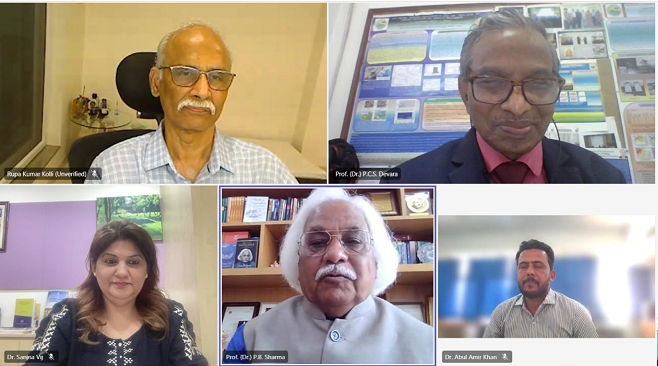World Meteorological Organization (WMO) Day Celebrated at Amity University Haryana (AUH)
Amity University Haryana (AUH), Panchgaon-Manesar, marked the observance of WMO Day 2024 with an insightful and engaging online webinar, held on 22 March 2024 under the banner of “At the Frontline of Climate Action.” This commemorative event was organized by the collaborative efforts of the Centre of Excellence (CoE) in Ocean-Atmospheric Science and Technology (ACOAST), Environmental Science and Health (ACESH), and Air Pollution and Control (ACAPC), in association with the Amity Academic Staff College (AASC), Amity University Haryana (AUH)

The event began with a traditional lamp-lighting ceremony, followed by a prayer to Goddess Saraswathi, symbolizing the pursuit of knowledge and wisdom. Introductory remarks about the theme of the event were presented by Prof. (Dr.) Sanjna Vij, Dy. Director, Amity Academic Staff College (AASC), School of Liberal Arts, and Dr. Sahil Wadhwa, Assistant Professor, Centre of Excellence in Ocean-Atmospheric Science and Technology (ACOAST), AUH.
Prof. Sanjna Vij extended warm wishes to all participants, celebrating both World Meteorological Organization Day (WMO-2024) and World Water Day (WWD-2024). She emphasized the interconnectedness of weather and water, highlighting the importance of sustainable water resource management (SDG #6) in tackling climate challenges. Prof. Vij underscored the need for combined approaches and actions to address water and climate issues (SDGs #6 & 13), emphasizing the role of meteorological knowledge across various spatio-temporal scales in safeguarding our environment and fostering global sustainability.
Dr. Rupa Kumar Kolli, President of the Indian Meteorological Society and former Chief at the World Climate Applications and Services Division in the WMO Secretariat, Geneva, delivered an expert talk titled “Climate Knowledge for Climate Action.” He emphasized that climate knowledge, coupled with necessary capacity, is vital for effective climate action. Dr. Kolli provided an overview of WMO’s establishment as a specialized agency of the United Nations and its role as the authoritative voice on Earth’s atmosphere, oceans, climate, and water resources.
Highlighting this year’s World Water Day theme, “Water for Peace,” Dr. Kolli stressed the importance of climate services in building a climate-smart society and addressing climate-related challenges. He discussed WMO’s governance, gender balance, climate actions imperatives, seamless prediction framework, and opportunities for improved societal response and sustainable development. Dr. Kolli emphasized the prioritized areas of the Global Framework for Climate Services (GFCS), including agriculture, disaster risk reduction, water, health, and energy.
He underscored the need for enhanced collaboration and information exchange to cope with climate variability and change effectively. Dr. Kolli outlined future directions for enhancing regional products and services, sustaining climate services user forums, implementing state climate forms in local languages, and establishing a Regional Climate Centre Network for the Third Pole (Himalayan region). In conclusion, Dr. Kolli emphasized the importance of complementary efforts rather than competitive ones and urged sustainable user forums for the environment, agriculture, energy, and health. He called for increased national implementation partnerships to address climate challenges comprehensively.
Prof. P.B. Sharma, Honorable Vice Chancellor, AUH, during his address, urged the academic and research communities to prioritize air quality, water scarcity, and energy production. Prof Sharma endorsed the formation of User Forums and stressed the need for immediate action, advocating for practical solutions over waiting for optimal ones. Prof. Sharma emphasized the importance of transitioning to green energy in mobility and construction activities to combat climate change.
He highlighted Delhi’s dust pollution and emphasized climate-friendly industrial practices, particularly in agriculture and industries like textiles and leather. Prof. Sharma urged scientists to collaborate with industries for innovative solutions, such as utilizing pulverized coal for energy production. He emphasized the role of academic institutions in advocating for climate action and educating future generations. Prof. Sharma concluded by showcasing Amity University Haryana’s initiatives in addressing climate challenges and called upon premier research institutions to lead by example in sustainable practices.
Prof. P.C.S. Devara, Director of ACOAST, delivered the Welcome Address, highlighting the significance of WMO Day as an annual event focused on protecting the Earth from natural and anthropogenic activities. This year’s theme, “On Frontline Actions on Climate,” underscores the complexity of climate science, emphasizing the need for multidisciplinary approaches to understand climate variability and its impacts. Prof. Devara outlined Amity University Haryana’s robust infrastructure, particularly in the Earth, Environment, and Climate cluster, showcasing cutting-edge experimental techniques and collaborations with prestigious institutions like IITM and NASA. He underscored AUH’s commitment to addressing critical areas in climate science, including source-sink linkages, climate services, aerosol pollutants, and environmental health. Prof. Devara emphasized the importance of today’s discussions, particularly the expert lecture by Dr. Rupa Kumar, in advancing knowledge about climate variability and driving meaningful action.
Prof. Dr. Sanjna Vij, Dy. Director, Amity Academic Staff College (AASC), during her address emphasized that Achieving SDG 13, which focuses on Climate Action, needs everyone’s help – governments, businesses, communities, Universities, colleges, schools, and people like you and me. We need to come up with smart and new ideas and work together with others worldwide.
We need to Remember, that what we do now will affect the future. Prof Sanjna Vij added that Universities are hubs of research and innovation, where scientists and scholars conduct studies to better understand climate change, its impacts, and potential solutions. Through interdisciplinary research, universities contribute to the development of innovative technologies, policies, and practices aimed at mitigating greenhouse gas emissions, adapting to climate change, and promoting sustainability.
The celebration concluded with the discussion/solutions on the following research gap areas:
• Vertical distributions of aerosol pollutants to account for the longitudinal/latitudinal transportation processes.
• Downscaling of datasets to derive conclusions about global to regional climate scenarios.
• Connections between climate education and policy.
• Susceptibility versus resilience.
• Vulnerability vis-à-vis adaptation.
• Development of seamless models for simulation/forecasting of climate change.
• Application of Artificial Intelligence and Machine Learning techniques for improving climate observations and modelling.
The event concluded with the vote of thanks to the participants by Dr. Abul Amir Khan, Assistant Professor, ACOAST, AUH.
